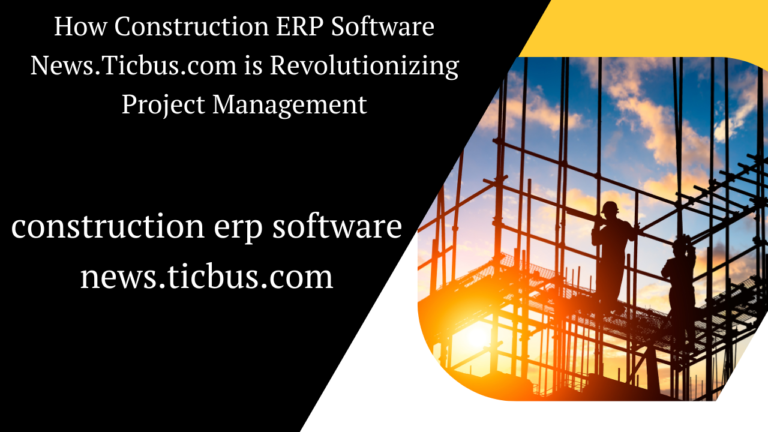The construction industry, known for its complexity and project management challenges, has begun to embrace technology to streamline operations and enhance project efficiency. Among the most transformative tools in this sector is construction ERP software, which integrates various business functions into one system. News.Ticbus.com has been at the forefront of covering innovations in construction ERP software, providing valuable insights on how these tools are reshaping the construction landscape. In this article, we’ll explore the latest updates, trends, and benefits of construction ERP software news.ticbus.com in transforming the construction industry.
What is Construction ERP Software?
Construction ERP software is a comprehensive system designed to integrate core processes of construction companies such as project management, financial management, procurement, and human resources. The key advantage of an ERP system is its ability to centralize data, ensuring that all stakeholders—whether on-site workers, project managers, or executives—have access to real-time, accurate information.
According to construction ERP software news.ticbus.com, ERP systems are evolving with cutting-edge technology like artificial intelligence (AI) and cloud computing, offering features like automated workflow, real-time reporting, and predictive analytics. These advancements help construction companies improve efficiency, reduce errors, and enhance decision-making capabilities.
How Construction ERP Software Benefits Construction Companies
The impact of construction ERP software news.ticbus.com on construction businesses cannot be overstated. Let’s take a closer look at the key benefits:
Improved Project Management
Construction projects involve numerous moving parts, from scheduling to budgeting, and managing them efficiently can be daunting. ERP systems streamline project management by providing a unified platform for scheduling, resource allocation, and progress tracking. Real-time updates allow project managers to make adjustments as needed, helping ensure projects stay on time and within budget.
Enhanced Financial Management
The financial management module of construction ERP software automates various accounting processes, such as invoicing, payroll, and budgeting. This not only reduces administrative overhead but also provides better financial visibility. As reported by construction ERP software news.ticbus.com, financial transparency is crucial for construction firms, especially in handling complex contracts and subcontractor payments.
Increased Efficiency and Productivity
One of the key advantages of construction ERP software is its ability to automate time-consuming manual tasks. By digitizing processes such as order processing and inventory management, construction firms can reduce operational costs and improve overall productivity. According to industry experts covered on construction ERP software news.ticbus.com, integrating IoT (Internet of Things) technology with ERP systems further enhances efficiency by providing real-time data on equipment and material usage.
Better Collaboration and Communication
Effective communication is essential in construction projects, and ERP systems provide a platform for all team members to stay informed. Whether it’s sharing blueprints, project updates, or safety reports, construction ERP software enables seamless communication across different departments and locations. This is particularly beneficial in large-scale projects with multiple stakeholders, where miscommunication can lead to costly delays.
The Latest Trends in Construction ERP Software
Construction ERP software news.ticbus.com regularly reports on the latest trends driving the evolution of these platforms. Here are some of the most notable advancements:
Cloud-Based Solutions
Cloud-based ERP systems are becoming the norm in the construction industry. Unlike traditional on-premise software, cloud-based solutions provide flexibility, scalability, and access to data from any location. This is particularly important for construction projects that span multiple sites. Cloud platforms also enable automatic updates and easier integration with other technologies.
AI and Predictive Analytics
Artificial intelligence (AI) and machine learning (ML) are revolutionizing construction ERP systems by enhancing decision-making capabilities. By analyzing historical project data, AI can predict project risks, identify cost overruns, and provide valuable insights into future project performance. As highlighted in construction ERP software news.ticbus.com, these predictive capabilities help construction managers mitigate risks before they become major issues.
Mobile Accessibility
Construction is a dynamic field where on-the-go access to data is crucial. Mobile accessibility is a growing trend in ERP software, allowing workers and project managers to access key information via smartphones and tablets. Whether it’s submitting reports from the job site or accessing project plans, mobile ERP solutions ensure that users stay connected and informed no matter where they are.
Integration with BIM (Building Information Modeling)
The integration of construction ERP software with Building Information Modeling (BIM) tools is another exciting development. BIM allows for 3D modeling of construction projects, helping teams visualize the end result and improve project planning. When paired with ERP systems, BIM technology enhances collaboration and data sharing, improving accuracy and reducing the risk of errors.
Why Construction Companies Need ERP Software Now More Than Ever
In today’s competitive construction market, companies cannot afford to rely on outdated systems or manual processes. As construction projects become more complex and involve an increasing number of stakeholders, ERP software becomes a vital tool for staying organized and efficient.
As reported on construction ERP software news.ticbus.com, construction firms that implement ERP systems can achieve greater transparency, streamline communication, and ensure that projects are completed on time and within budget. ERP software not only simplifies day-to-day operations but also provides valuable data that can drive long-term strategic decisions.
Choosing the Right Construction ERP Software
When choosing construction ERP software, companies must consider their unique needs and the specific features offered by different systems. According to experts from construction ERP software news.ticbus.com, factors to consider include:
- Scalability: The software should be able to grow with the company and handle larger projects as the business expands.
- Customization: A good ERP system should offer flexibility, allowing companies to tailor the software to their specific processes.
- Vendor Support: Strong customer support is essential, especially during the implementation phase.
- User-Friendliness: The software should be intuitive and easy to use, reducing the need for extensive training.
The Future of Construction ERP Software
The future of construction ERP software news.ticbus.com looks promising, with new developments in AI, IoT, and cloud computing continuing to shape the industry. These innovations will further enhance the capabilities of ERP systems, making construction management even more efficient and effective.
In the coming years, we can expect ERP systems to become even more integrated with other technologies, such as drones for site surveying and autonomous vehicles for material delivery. As construction firms increasingly rely on technology to stay competitive, ERP systems will be at the heart of these transformations.
FAQs
- What is construction ERP software? Construction ERP software integrates various business functions such as project management, accounting, and procurement into a single system, providing real-time access to crucial data.
- How does construction ERP software improve project management? ERP software streamlines project management by centralizing tasks like scheduling, budgeting, and resource allocation, ensuring projects stay on track.
- What trends are shaping the future of construction ERP software? Cloud-based solutions, AI, predictive analytics, mobile accessibility, and BIM integration are key trends driving the evolution of construction ERP systems.
- Why is mobile access important for construction ERP software? Mobile access allows workers and project managers to stay informed and connected, even while on the job site, ensuring that decisions are made in real time.
- How can construction ERP software improve financial management? ERP software automates accounting processes, offering better financial visibility and reducing the risk of errors in billing, payroll, and budgeting.
Conclusion
The construction industry is undergoing a technological revolution, and construction ERP software news.ticbus.com has played a pivotal role in informing companies about the latest advancements. By adopting ERP software, construction firms can enhance efficiency, improve project management, and stay competitive in a fast-evolving industry. As we move forward, these systems will continue to evolve, offering new tools and capabilities to help construction companies tackle the challenges of tomorrow.


